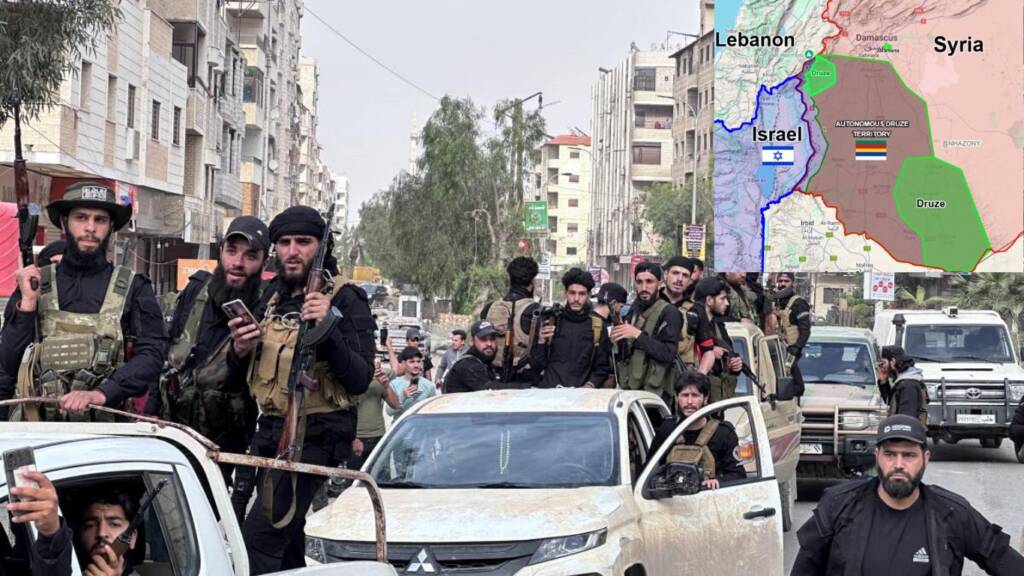In a decisive show of support for the embattled Druze community in Syria, Israel carried out a targeted military operation this week. Israel struck an extremist group near Damascus as it prepared to attack the Druze-majority town of Sahnaya. The strike follows through on a long-standing Israeli promise to protect the Druze—a promise that now holds new urgency as Syria plunges into another wave of religious and sectarian violence in the wake of Bashar al-Assad’s ouster and Islamist groups taking Damascus.
The Israeli Defence Forces (IDF) confirmed it launched what it called a “warning operation” against radical Sunni militants who had taken up arms against the Druze, a religious minority with historical roots in Syria, Lebanon, and Israel. The Israeli government emphasized that the operation was not only defensive, but humanitarian.
“The people of the Druze community are our brothers,” said Prime Minister Benjamin Netanyahu in a joint statement with Defence Minister Israel Katz. “When extremists seek to massacre civilians simply because of their faith, Israel cannot and will not remain silent.”
The Druze faith, an offshoot of Islam, has long been targeted by jihadist groups. During Syria’s 14-year civil war, Druze villages came under attack from both regime forces and Islamist rebels. In recent months, the rise of Sunni Islamist factions following Assad’s fall in December 2024 has once again put Druze’s lives at risk.
Fighting erupted this week in Jaramana, a predominantly Druze suburb of Damascus, after a provocative voice recording surfaced—believed by Sunni militants to have originated from a Druze resident—cursing the Prophet Mohammad. What began as a skirmish quickly escalated into open conflict. By Wednesday, the violence had spread to nearby Sahnaya, where armed extremists attempted to storm the town.
According to the Syrian Observatory for Human Rights, 22 people were killed in the Sahnaya fighting, including six Druze defenders and 16 government-aligned security forces. The IDF stepped in as reports emerged of militants regrouping for another attack.
“Israel made it clear to the Syrian authorities that their failure to protect minorities would not be tolerated,” Defence Minister Katz said. “We will not stand by while the Druze are slaughtered.”
The strike comes amid growing fears among Syria’s minorities—Druze, Christians, and Alawites—that the post-Assad interim government, led by former al-Qaeda commander Ahmed al-Sharaa, is failing to contain Islamist militants. Despite promises of inclusivity, the new authorities have not yet established control over large parts of the country, and recent massacres, including the killing of hundreds of Alawites in March, have left minority communities increasingly vulnerable.
For Israel, the plight of the Druze is not a distant concern. The Druze community in Israel is tightly woven into the fabric of the nation. They serve in the military, hold public office, and maintain strong cultural and spiritual ties with their brethren across the border. There are also about 24,000 Druze living in the Israeli-occupied Golan Heights, many of whom have relatives in Syria.
Spiritual leader Sheikh Muwafaq Tarif, head of the Druze in Israel, confirmed that he had spoken with top Israeli officials as events unfolded. “We are closely monitoring the situation in Syria,” he said in a statement, “and we stand in solidarity with our people in Sahnaya, Jaramana, and beyond.”
The Israeli military also confirmed that three injured Syrian Druze were evacuated into Israel for medical treatment—a humanitarian gesture that underscores the close ties between the communities.
Inside Syria, Druze residents took up arms to defend their towns. In Jaramana, AFP correspondents witnessed hundreds of young Druze men—some just teenagers—manning barricades and distributing weapons. “For the past two days, the people of Jaramana have been on a war footing,” said Rabii Mondher, a local activist. “We don’t want war, but we will not be massacred.”
Mounir Baaker, a Druze elder, lost his nephew Riadh in the clashes. “We’re brought up to be tolerant, not to attack, but we have the right to defend ourselves,” he said, holding up a photo of the young man who had joined the security forces shortly after Assad’s fall. “Jaramana is not used to this level of hatred. We want peace—but peace with dignity and safety.”
Israel’s intervention has sparked predictable outrage from the interim Syrian government, which issued a broad condemnation of “foreign interference,“ but notably did not mention Israel by name. However, many Druze on the ground see Israel’s action not as interference, but as vital protection at a moment when Syria’s new rulers seem unable—or unwilling—to act.
For Israel and the Druze, however, the message is already clear: in a fractured Syria where minority rights are under siege, unity and action matter more than rhetoric.
As one Druze fighter in Sahnaya reportedly said: “We don’t want Israel to fight our battles. But we’re grateful they didn’t let us face the knives alone.”
